The priority of the university today, in addition to providing high-quality competitive education, is the formation of motivation to obtain it with a mandatory innovative component and the use of modern forms and technologies of education in combination with research and development.
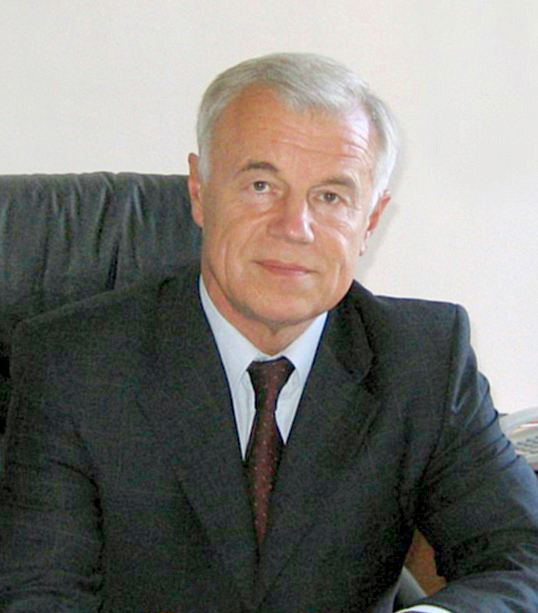 We have been working during pandemic for a year now. External challenges prevailed in the organization of full-fledged work of the university with the use of remote and mixed modes of the educational process. We are constantly improving and developing the university management system based on the results of measurement system, developing and updating the regulatory framework (more than 150 regulations have been developed), organizing the work of the commissions of the Academic Council of the University.
We have been working during pandemic for a year now. External challenges prevailed in the organization of full-fledged work of the university with the use of remote and mixed modes of the educational process. We are constantly improving and developing the university management system based on the results of measurement system, developing and updating the regulatory framework (more than 150 regulations have been developed), organizing the work of the commissions of the Academic Council of the University.
The activity of the university is based on a system of measurements. There are three main criteria: world rating (international respectability of the university) (Slide 1); indicators that are formed at the industry level - indicators of formula funding, and competitive indicators of government procurement. Such a system can work only in combination with all parts of the university. For this purpose, profiles of departments have been developed. We have used them many times for internal accreditations, today they allow you to create a database - objective and independent indicators - and analyze each profile of the department, ratings and objectively determine the level of work of a unit.
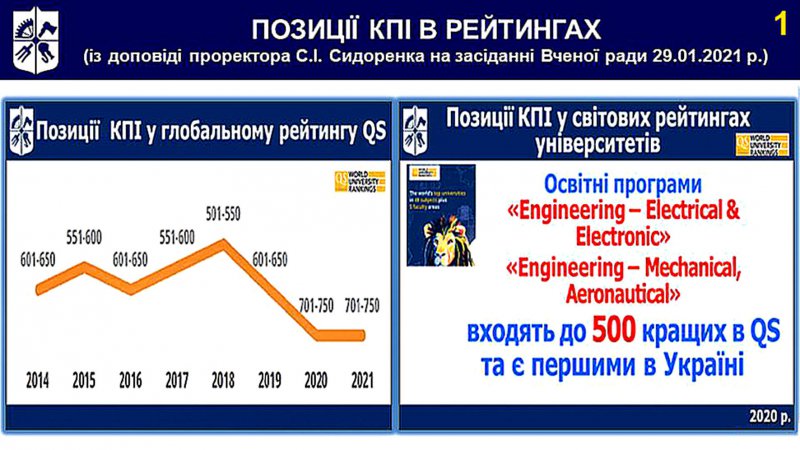
The Igor Sikorsky Kyiv Polytechnic Institute information system includes: Campus system, electronic document management system, social networks, telemedicine, media laboratory, IP-telephony. Websites are the main source of information about the university throughout the year - from applicants to employers. The quarterly monitoring we conduct has significantly improved the content of the websites, but there is still plenty of work to be done. There has also been some progress in spreading information through social networks (Slide 2).
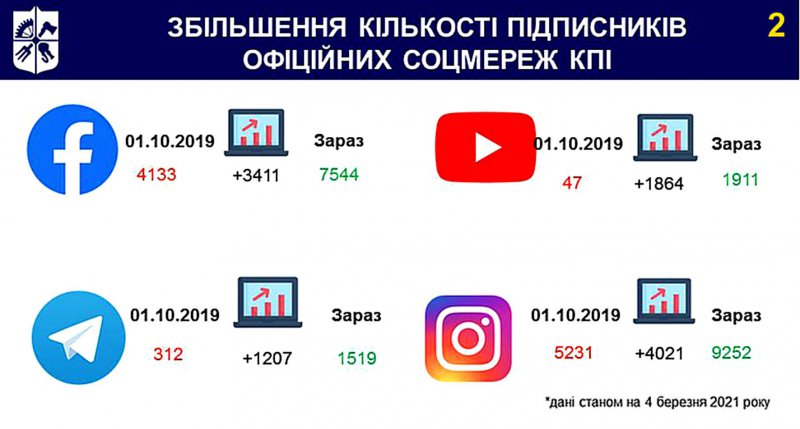
The Campus system provides distance education, measurement, control, etc. Of course, it needs improvement, and we are working on it. The electronic document management system is fully operational, there is a tele-medicine component of student services. The IP telephony system is the new level of internal communication, the transition to digital communication with all possible additional services.
Measurement tools are very important, but it is no less important that our policies are based on the results of this measurement. First of all - the financing of departments, which is carried out on the results of the unit. The university budget is strictly controlled and protected, which is very important - last year a university development fund was established. Last year, 53.4 million was spent from it, this year it is formed in the amount of 123.2 million (Slide 3). Expenditures for financing research work in 2020 - UAH 81 million (UAH 72 million in 2019). Expenditures for the purchase of equipment in 2020 - UAH 51.6 million. Expenditures for repairs in 2020 - UAH 60 million (UAH 36.6 million in 2019), in particular for repairs of academical buildings, external networks and landscaping - UAH 35.2 million (UAH 13.6 million in 2019).
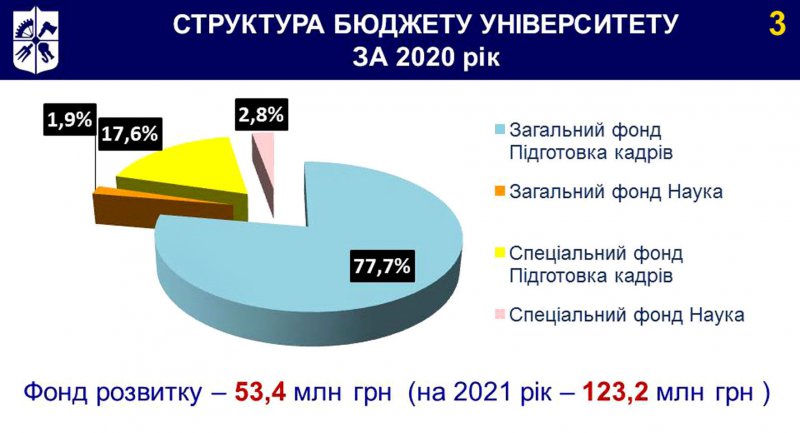
Quality of specialists training. This is a complex task, for the implementation of which first of all the education quality assurance system should work. An important component of it is academic integrity (Slide 4).
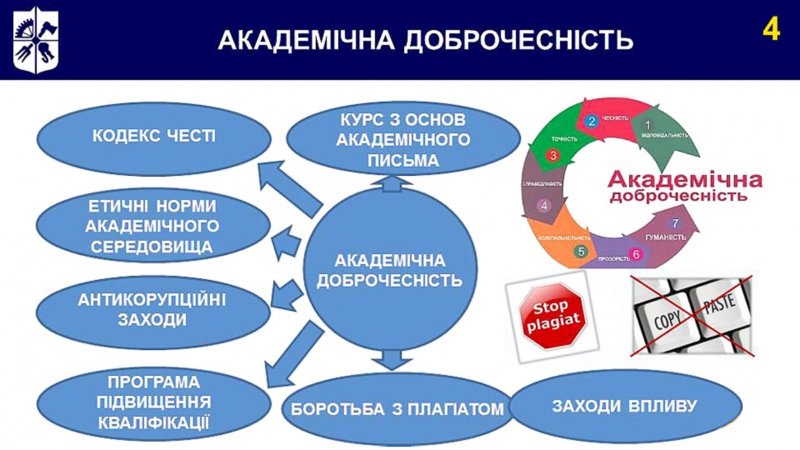
For the functioning of the internal quality assurance system of higher education in Igor Sikorsky Kyiv Polytechnic Institute, we must take care of opening and updating existing educational programs based on the analysis of prospects for the development of each sector of industry in the new "digital" economy and make rapid changes in the structure, scope, content and quality of training in each speciality; complete the internal accreditation of PhD programs with the definition of mandatory participation in them for each graduate department; systematically conduct internal accreditation and self-analysis based on the requirements of external accreditation and established criteria; ensure the principles of academic integrity at all levels.
Educational programs need to be created and developed with a focus on perspective. There are no graduate students at 12 departments this year. Internal accreditation was conducted at 123 departments in 46 specialities. Based on its results, the Academic Council approved the structural changes that took place in 16 departments. Today we have 107 departments at the university.
In 2019/2020 academic year 15 educational programs passed external accreditation, one received exemplary accreditation. This year 5 masters educational programs(EP) have already been accredited, 8 are accredited, 27 programs are being prepared for accreditation (including 25 programs of doctors of philosophy). Please note that we do not release any program that does not meet the requirements for external accreditation. Accreditation plan for 2021/2022 academic year - 65 EP (EP bachelor - 25, EP master - 20, EP doctor of philosophy - 20), for 2022/2023 academic year. - 67 EP (EP bachelor - 17, EPP master - 29, EPT master - 21). Program preparation is a three-year hard work that should strongly involve all our teams. But with all the problems associated with accreditation, in particular with the issue of financial security, we can say with confidence that the prepared programs really meet all the requirements.
Tasks to ensure the activities of the university: accreditation of educational programs of three levels of higher education; use and improvement of the system of financing of divisions according to the formula which includes the basic indicators of activity of division; observance and improvement of the three-level system of indicators of activity of divisions with the universal database coordinated with individual ratings of scientific and pedagogical workers; analysis of performance results and optimization of the structure of the university departments according to the criteria of compliance with the requirements of accreditation, licensing, scientific certification and the status of the research university.
Therefore, human resources are the main component of a high-quality educational process. Among our teachers there is a unity of veterans with young people. The largest number of teachers is middle-aged. When in 2020 we accepted 220 new research and teaching staff, including 26 professors and 46 associate professors, only 92 people, less than half, where from the graduate students. When we talk about staff, student feedback is a very important component. The results of assessment by students are not left out - they are directly included in the rating of each teacher (for each remark we require the reaction of the unit) and have an impact on competitive selection for positions and determining the term of election. This year, almost 9,000 students took part in the survey, 2,037 teachers were evaluated (average score 4.01 - 4.31). Research and teaching staff and other employees improve their skills in Institutes of after diploma training - 586 people, undergo internships in leading domestic scientific, educational and industrial institutions - 6 people, foreign internships - 68 (including 21 internships abroad and 47 - remotely).
Tasks for the quality assurance of Research and teaching staff : strict compliance with the conditions of competitive selection with the determination by the tender commission of the terms of contracts and the introduction of key performance indicators; implementation by the departments of systematic quality control of classes, in particular in the remote mode, taking into account the survey of students and annual reports at the department; conducting an annual analysis of the activities of structural units by the expert-qualification (competitive) commission of the university with the provision of an appropriate assessment; presentation of ratings of scientific and pedagogical workers with obligatory consideration and approval by their department; introduction of a cumulative system of targeted professional development and internships for teachers with mandatory reporting; introduction of a permanent system of personnel reserve formation with wide involvement of postgraduate and master's graduates, scientists from NASU and foreign scientists in teaching.
In work with applicants, we tried to conduct research on the choice of profession, ie how, who and which way they go to engineering. Among the motives - the desire for public recognition, abilities, inclinations, advice from friends, information (which is important to us). Because we must provide it in full. Career guidance work in Igor Sikorsky Kyiv Polytechnic Institute is conducted in many forms and very actively (Slide 5).
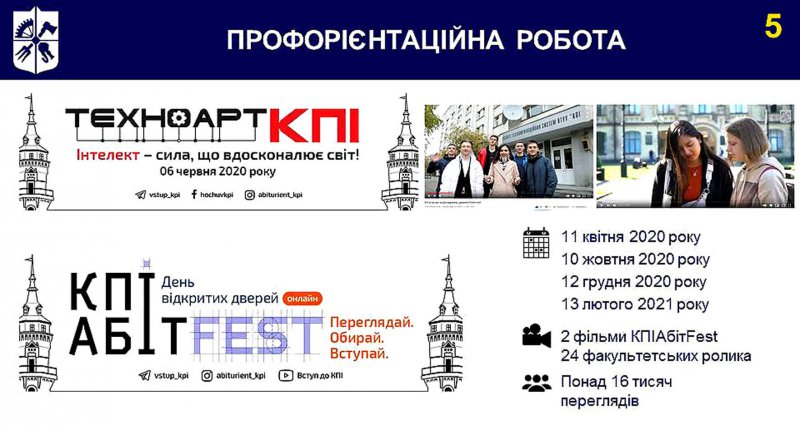
The maximum volume of the state order in 2020 - 4283 people (3898 in 2016), the average competition for applications was different for different faculties, on average - 8.9 (from 2.37 in IMZ to 28.82 in FL). Lets remind that the maximum amount is formed by the tender commission of the Ministry of Education and Science, which does not include any representative of the HEI, and mainly formed from employers. In our university it grows from year to year. This is an objective indicator that is determined by the results of our work. If you look at the dynamics of admission to bachelors, every year for the past five years, the number of bachelors, which we accepted on a budget and in general, has grown (5175 in 2020 against 3743 in 2016). In today's conditions, this is a very positive result. In terms of the number of contract students, the absolute champion is FIOT (386 people), FMM is close to him (323 people), followed by IASA, FSP, VPI, FTI. In total, 67 graduates of the Polytechnic Lyceum of were enrolled, graduates of the Technical Lyceum - 54, SDP graduates - 422 (Slide 6).
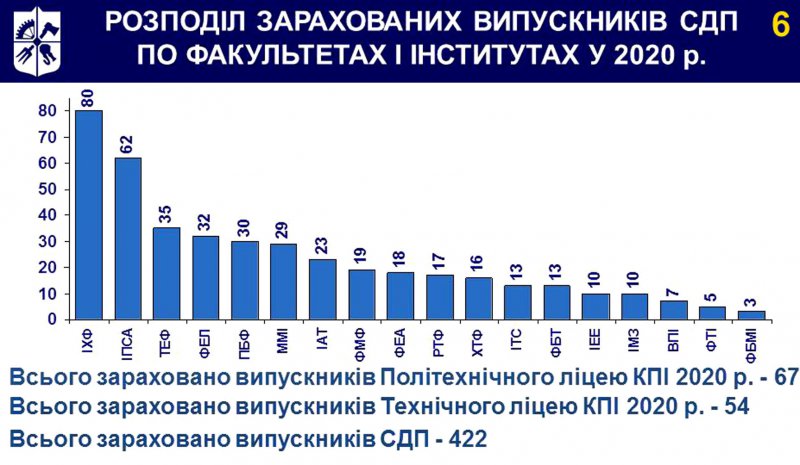
The main tasks of providing a quality contingent of applicants: introduction at all departments of informing and carrying out of actions on formation of attractiveness and popularization of educational programs and representation of competitiveness of their graduates, continuation of cooperation with Small Academy of Sciences, organization of Olympiads, exhibitions, creative competitions, centres of scientific and technical creativity, and also introduction of new forms of career guidance work, expansion in systems of pre-university training with the involvement of all faculties / institutes.
If we talk about the requirements for the content of education, it is innovation, relevance, focus on results, and most importantly - demand. Motivation of students to study guarantees very important components that need to be formed. Everything is determined by educational programs. The requirements for them are quite serious and complex. These, in addition to compliance with all conditions of accreditation, are the availability of appropriate scientific school, relevance in the labour market, implementation of scientific and technical developments, international recognition, etc. Today we have 122 educational programs for bachelors in 42 specialities, 125 programs for professional and 99 for scientific masters. They meet standards based on market demands and a student-centered approach. Students have the opportunity to form their own educational trajectory. They are offered both a wide variety of choice of disciplines and specialized certificate programs, the mastery of which is evidenced by the relevant certificates, which the student can receive together with the diploma.
Our educational process is organized by three departments: quality of the educational process (DQEP), educational work, organization of the educational process. They work is coordinated and organized. All scientists and research groups at the university should be involved not only in research and innovation, but also in the educational process. And an international component has to close the chain "education - science - innovation", as research groups must participate in international projects and grant programs.
Coordination between education and research departments: formation of topics of master's and PhD dissertations on the basis of scientific groups, their scientific component, scientific developments with students, joint participation of scientists and students in the competition "Sikorsky Challenge", scientific conferences, including in the industrial market, international programs and grants, agreements with foreign partners , complex agreements with enterprises. The Coordinating Council, which started working for us last year, solves these issues. All cooperation agreements (more than 350 of them) are also concluded with enterprises and companies, taking into account a comprehensive program developed jointly by the Career Development Centre, SRD and DQEP. All the centres that are opening in our country are educational-scientific centres, where scientific work and work with students are combined, this also applies to international companies.
And so we recruited applicants for the first year. And then what to do with them? Unfortunately, the problem of the quality of residual school knowledge remains (Slide 7).
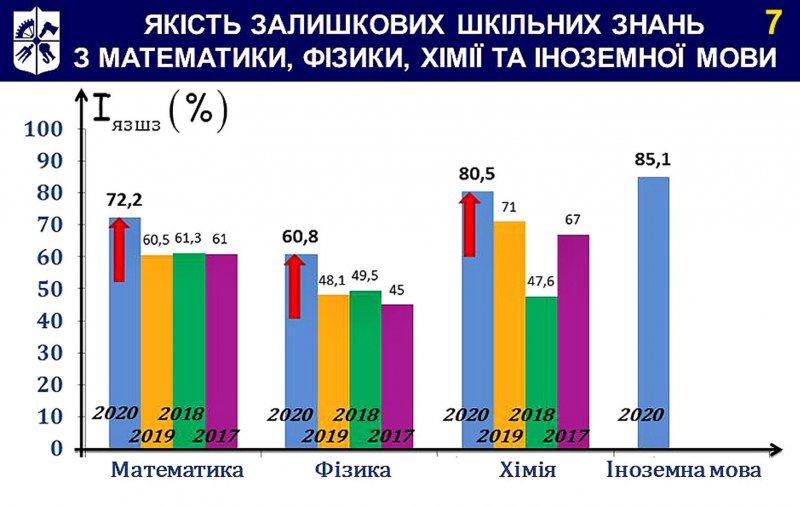 We never deviate from internal entrance control, in fact residual knowledge in mathematics is adjusted with a passing score for faculties. Same is true for physics. This year it is difficult to expect better results, because very, very few students choose physics for the external examination. Therefore, the issues of adaptation and adjustment courses remain very relevant. To date, we have introduced adaptation courses in mathematics and physics, corrective courses in a foreign language.
We never deviate from internal entrance control, in fact residual knowledge in mathematics is adjusted with a passing score for faculties. Same is true for physics. This year it is difficult to expect better results, because very, very few students choose physics for the external examination. Therefore, the issues of adaptation and adjustment courses remain very relevant. To date, we have introduced adaptation courses in mathematics and physics, corrective courses in a foreign language.
Motivation promotes the emergence of student initiative and interest in learning, encourages him to act with maximum energy. Both the motivation to enter a certain speciality and the motivation to work hard in order to study well are essential for the end result. What motivates students? Enthusiasm of teachers, relevance of the material, organization of the course, appropriate level of complexity, active involvement of students, mutual understanding between students and the teacher. What are the components of this motivation? One of them is a choice. It is very important for students. Therefore, the issue of elective courses is not just a formal 25%, it is an opportunity for students to express their personality.
In addition, we are quite active in implementing formal and non-formal education. When students have the opportunity to obtain knowledge from a significant source that is not directly part of the system of organization of the educational process, this is allowed and welcomed. And as a result - the presence of a mandatory individual student curriculum. To date, this is also his "face", his demands, the exercise of the right to choose. Students form their IC in consultation with the curator of the study group and (if necessary) with the person responsible for the formation of curricula for the department.
We invite bachelors, according to our concept, to participate in innovative scientific work, to work on specific developments. For this purpose, there are 70 scientific workshops, 33 engineering workshops, 13 socio-humanitarian workshops. More than 1000 students are involved in the active work. They are connected directly with the research groups operating at the departments.
The main tasks of ensuring the quality of education at the "bachelor" level: expansion and improvement of the system of entrance testing as a necessary element of objective assessment of the entrance level of entrants; providing the necessary level of basic training for bachelors, in particular with the use of adaptation courses in physics / mathematics; consolidation of students in the educational program on the basis of conscious choice; improving the system of choice of disciplines and implementation of certificate programs; introduction of a system of forming an individual learning trajectory on the basis of an individual student's curriculum; transfer of elements and advantages of target and dual training to the bachelor's level; providing training in a foreign language at a level not lower than B1; defining the preparation of the "bachelor" level as the first stage of innovation-oriented training, in which the student is invited to research and innovation activities.
The master is a specialist in the field of innovative economics, able to comprehensively combine research, design and entrepreneurial activities aimed at creating highly efficient production structures. When we talk about the dynamics of admission to the master's level, the number has decreased significantly compared to last year, mainly due to the fact that in recent years the state order has decreased (1286 people in 2020 against 2271 people in 2018, full-time, budget). The state is reconsidering its attitude to the training of masters. Certain sociological studies show that masters do not have an advantage in employment over bachelors if they do not prepare for specific jobs in a targeted way. Admission of graduates from other HEI is an appropriate test for us. Thanks to our scientific schools, they choose second-level training at Igor Sikorsky Kyiv Polytechnic Institute (Slide 8). In 2020, there are 245 such persons, including 43 at the FSP, 30 at the TEF, and 29 at the FMM.
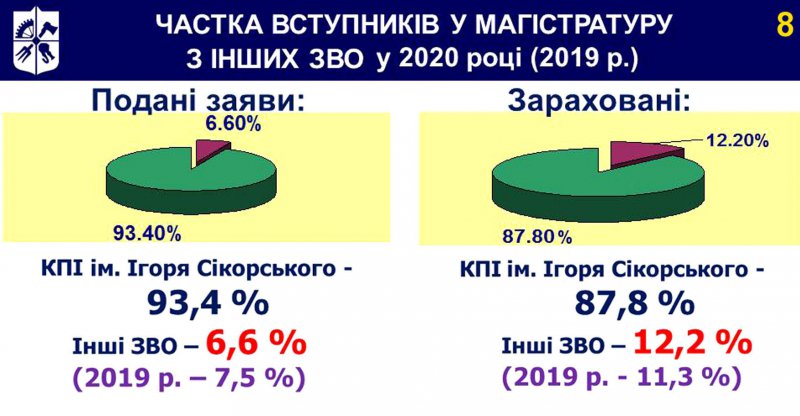
Characteristics of masters of 2020 admission (full-time form of study): training in educational and professional programs - 42 specialities, 127 educational programs at 117 departments; training in educational and scientific programs - 31 specialities, 104 educational programs at 96 departments. An indicator of the effectiveness of master's training is participation in the "Sikorsky Challenge" (Slide 9).
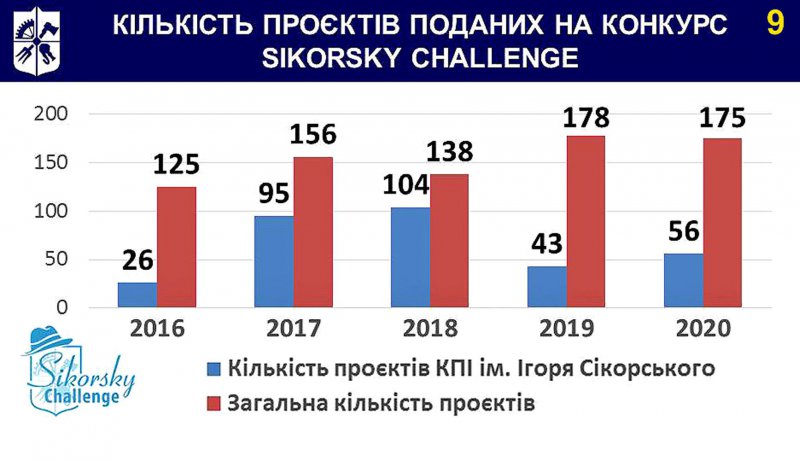
The main tasks of the development of the educational level "master": ensuring demanding competitive selection of entrants to the master's degree; defining the preparation of the level of "master" as the second stage of innovation-oriented training, in which the student's scientific and innovative activities and the implementation of scientific and technical developments are mandatory; introduction of targeted training for professional masters and its highest form - dual education as a way of effective use of graduates in the labour market; providing training in a foreign language at a level not lower than B2.
In 2020, 249 people are enrolled in graduate school: 87% - our graduates, 51% - graduated with honours, 78% - have scientific achievements. Last year, 60 people graduated from graduate school, 2 of whom defended before deadline. In 2020, 7 people are enrolled in doctoral studies.
The main tasks of the development of the educational-scientific level "PhD": optimization of the list of educational PhD programs by specialities in accordance with scientific schools; ensuring the implementation of independent research and innovation work and the implementation of real developments; presentation of scientific results at international conferences and in scientometric publications, including in a foreign language; promoting the development of scientific schools of the department; improving language training by involving candidates for the degree of Doctor of Philosophy in the educational process.
Tasks for creating conditions for integration into the European educational space: introduction of English-language courses and educational programs at all departments of the university and the system of teacher incentives; expansion of international mobility, double degree programs, other forms of international cooperation; intensification of training of a new generation of teachers, scientists and managers, educated on the principles of global, European thinking and mentality, new ambitions, with knowledge of English, European culture, history; continuation of work on international accreditation.
Igor Sikorsky Kyiv Polytechnic Institute should be a world-class technical research university, providing training of highly qualified specialists capable of creating modern scientific knowledge and innovative technologies for the benefit of mankind and ensuring a worthy place for Ukraine in the world community.
